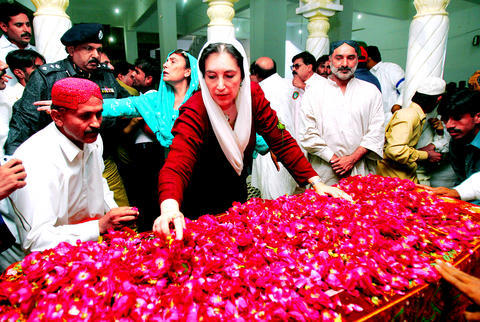The assassination of opposition leader Benazir Bhutto deals a stunning blow to liberal political forces trying to combat rising Islamic extremism in Pakistan.
Gathering unrest by her supporters also risks tipping the volatile country into chaos and puts additional pressure on President Pervez Musharraf as he struggles to keep order and stay in power.
It scuppers hopes of Western governments that the charismatic, two-time former prime minister could team up with Musharraf and galvanize Pakistan's struggling fight against Taliban and al-Qaeda militants after Jan. 8 elections that are now themselves in doubt.

PHOTO: AFP
"This assassination is the most serious setback for democracy in Pakistan," said Rasul Baksh Rais, a political scientist at Lahore's University of Management Sciences. "It shows extremists are powerful enough to disrupt the democratic process. Musharraf's major concern now will be maintain law and order and make sure this does not turn into a major movement against him."
SUICIDE ATTACK
Bhutto died on Thursday when an attacker shot her and then blew himself up as she left a political rally in Rawalpindi, a city near the capital where Pakistan's army has its headquarters. It was second suicide attack against her since her tumultuous homecoming from an eight-year exile in October.
The other key opposition leader, Nawaz Sharif -- whose government was ousted in the 1999 coup that brought Musharraf to power -- quickly announced he was boycotting the parliamentary elections that are meant to usher Pakistan toward civilian government after years of military dominance.
Talat Masood, a retired general and now a political analyst, expected Bhutto's party to follow suit -- a move that would rob the vote of legitimacy.
Musharraf could become a political casualty of the unfolding crisis amid perceptions his government failed to provide adequate security for Bhutto. She had accused elements in the ruling party of backing militants to kill her -- claims that could gain more traction now despite government denials.
DANGEROUS
At the very least, the government will appear to be losing its grip on Pakistan.
"Conditions in the country have reached a point where it is too dangerous for political parties to operate," Masood said.
He anticipated that Musharraf, who recently suspended the Constitution for six weeks and purged the Supreme Court of judges who could have scuppered his own election to a new five-year term, could take drastic steps.
"It is possible they could declare an emergency again," Masood said.
Musharraf, who was himself targeted twice in Rawalpindi by al-Qaeda bombers in December 2003, gave no immediate sign of an authoritarian backlash to Bhutto's assassination. He declared three days of national mourning and vowed to fight the terrorists behind her killing.
AMNESTY
Only a few months ago, he held direct talks with Bhutto and later signed a corruption amnesty that paved the way for her return from exile.
But Anthony Cordesman at the Center for Strategic and International Studies in Washington, warned that any suspicion that Musharraf had a role in Bhutto's killing or knew about the plot and failed to prevent it could pitch Pakistan "to the edge of civil conflict."
"Much will depend on whether some Islamist extremist movement announces that it committed the attack, but even then a substantial number of Pakistanis will still see the Musharraf government as being at least indirectly involved and there would be a flood of destabilizing conspiracy theories," Cordesman said.
Bhutto was the figurehead of Pakistan's most prominent political family and party -- a mantle she adopted following the execution of her father Zulfiqar Ali Bhutto in 1979 during a former military regime. Her demise was a shock to Pakistanis, capping one of the most turbulent years in the country's six-decade history that has shaken Musharraf's standing both at home and abroad.
VOLATILE
Taliban militants that have caused havoc in neighboring Afghanistan in recent years have become a threat to Pakistan's own stability -- not only grabbing effective control of tracts of the volatile northwestern frontier, but launching attacks in cities elsewhere.
Western allies, particularly the US and Britain, viewed Bhutto as a potential ally for Musharraf who could stand up to this growing militant threat and galvanize the campaign against terrorism, amid signs that al-Qaeda's leadership has reconstituted itself inside Pakistan, posing a risk to global security.
"In a society becoming increasingly intolerant, she was being viewed by the international community as a person who could make a difference as a moderate politician, who, if she came to power, could turn the tide of religious extremism in this country," said Zaffar Abbas, an editor for the Dawn newspaper.
BUSH ADMINISTRATION
The Bush administration, which had invested much diplomatic capital in achieving a rapprochement between Musharraf and Bhutto scrambled on Thursday with the implications of her death.
Christine Fair, a South Asia expert with Rand Corp, said that demands for Musharraf's departure will increase after Bhutto's assassination. But Washington still views him as a critical ally and "likely does not have a plan" for the contingency of him stepping down in these circumstances, Fair said.
In a harbinger of the political instability that now beckons, Sharif, a longtime rival of Bhutto, sounded defiant on Thursday and Bhutto's supporters rampaged across Pakistan's cities.
"We will take the revenge on the rulers," a tearful Sharif said after he rushed to the Rawalpindi hospital where Bhutto was taken and sat beside her corpse.
Bhutto's Pakistan People's Party, the largest secular political group in Pakistan, itself faces a challenge to find a successor to the former prime minister. The party proved largely ineffectual in opposition to Musharraf during her years in exile or as a bulwark against extremism.
"She was the most powerful leader with a liberal background and had the confidence to confront religious extremists ... Among Pakistanis in general there will be fear about the future," said Hasan-Askari Rizvi, a political analyst and author.
But Cordesman stressed the domestic turmoil was very unlikely to endanger the safety of Pakistan's nuclear arsenal. The government has rejected suggestions that Islamic militants might assault facilities where they are stored.
"They are not stored where public riots or demonstrations can affect them and there is no reason the military should become unstable or their security should be compromised," Cordesman said.

Nauru has started selling passports to fund climate action, but is so far struggling to attract new citizens to the low-lying, largely barren island in the Pacific Ocean. Nauru, one of the world’s smallest nations, has a novel plan to fund its fight against climate change by selling so-called “Golden Passports.” Selling for US$105,000 each, Nauru plans to drum up more than US$5 million in the first year of the “climate resilience citizenship” program. Almost six months after the scheme opened in February, Nauru has so far approved just six applications — covering two families and four individuals. Despite the slow start —

North Korean troops have started removing propaganda loudspeakers used to blare unsettling noises along the border, South Korea’s military said on Saturday, days after Seoul’s new administration dismantled ones on its side of the frontier. The two countries had already halted propaganda broadcasts along the demilitarized zone, Seoul’s military said in June after the election of South Korean President Lee Jae-myung, who is seeking to ease tensions with Pyongyang. The South Korean Ministry of National Defense on Monday last week said it had begun removing loudspeakers from its side of the border as “a practical measure aimed at helping ease

DEADLY TASTE TEST: Erin Patterson tried to kill her estranged husband three times, police said in one of the major claims not heard during her initial trial Australia’s recently convicted mushroom murderer also tried to poison her husband with bolognese pasta and chicken korma curry, according to testimony aired yesterday after a suppression order lapsed. Home cook Erin Patterson was found guilty last month of murdering her husband’s parents and elderly aunt in 2023, lacing their beef Wellington lunch with lethal death cap mushrooms. A series of potentially damning allegations about Patterson’s behavior in the lead-up to the meal were withheld from the jury to give the mother-of-two a fair trial. Supreme Court Justice Christopher Beale yesterday rejected an application to keep these allegations secret. Patterson tried to kill her

CORRUPTION PROBE: ‘I apologize for causing concern to the people, even though I am someone insignificant,’ Kim Keon-hee said ahead of questioning by prosecutors The wife of South Korea’s ousted former president Yoon Suk-yeol yesterday was questioned by a special prosecutor as investigators expanded a probe into suspicions of stock manipulation, bribery and interference in political party nominations. The investigation into Kim Keon-hee is one of three separate special prosecutor probes launched by the government targeting the presidency of Yoon, who was removed from office in April and rearrested last month over his brief imposition of martial law on Dec. 3 last year. The incident came during a seemingly routine standoff with the opposition, who he described as “anti-state” forces abusing their legislative majority to obstruct